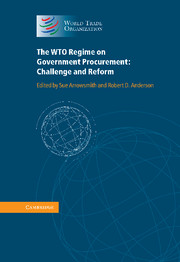Book contents
- Frontmatter
- Contents
- List of contributors
- Foreword by Pascal Lamy
- Perspective of the Chairman of the WTO Committee on Government Procurement, Nicholas Niggli (Switzerland)
- Preface
- Disclaimer
- PART I The WTO regime on government procurement
- PART II Expanding the scope of the Agreement on Government Procurement: accession and coverage
- 2 Forging a more global procurement market: issues concerning accessions to the Agreement on Government Procurement
- 3 Accession to the Agreement on Government Procurement: the case of China
- 4 India's possible accession to the Agreement on Government Procurement: what are the pros and cons?
- 5 The benefits for developing countries of accession to the Agreement on Government Procurement: the case of Chinese Taipei
- 6 The coverage negotiations under the Agreement on Government Procurement: context, mandate, process and prospects
- 7 Canada's sub-central government entities and the Agreement on Government Procurement: past and present
- 8 The procurement of state trading enterprises under the WTO Agreements: a proposal for a way forward
- 9 Addressing purchasing arrangements between public sector entities: what can the WTO learn from the EU's experience?
- PART III Revision of the procedural rules and other transparency provisions of the Agreement on Government Procurement
- PART IV Developing countries in the WTO procurement regime
- PART V Economic and social development (horizontal policies) in government procurement
- PART VI Enforcement and remedies
- PART VII Multilateralism and regionalism
- PART VIII Challenges and new directions
- Index
- References
8 - The procurement of state trading enterprises under the WTO Agreements: a proposal for a way forward
from PART II - Expanding the scope of the Agreement on Government Procurement: accession and coverage
Published online by Cambridge University Press: 07 September 2011
- Frontmatter
- Contents
- List of contributors
- Foreword by Pascal Lamy
- Perspective of the Chairman of the WTO Committee on Government Procurement, Nicholas Niggli (Switzerland)
- Preface
- Disclaimer
- PART I The WTO regime on government procurement
- PART II Expanding the scope of the Agreement on Government Procurement: accession and coverage
- 2 Forging a more global procurement market: issues concerning accessions to the Agreement on Government Procurement
- 3 Accession to the Agreement on Government Procurement: the case of China
- 4 India's possible accession to the Agreement on Government Procurement: what are the pros and cons?
- 5 The benefits for developing countries of accession to the Agreement on Government Procurement: the case of Chinese Taipei
- 6 The coverage negotiations under the Agreement on Government Procurement: context, mandate, process and prospects
- 7 Canada's sub-central government entities and the Agreement on Government Procurement: past and present
- 8 The procurement of state trading enterprises under the WTO Agreements: a proposal for a way forward
- 9 Addressing purchasing arrangements between public sector entities: what can the WTO learn from the EU's experience?
- PART III Revision of the procedural rules and other transparency provisions of the Agreement on Government Procurement
- PART IV Developing countries in the WTO procurement regime
- PART V Economic and social development (horizontal policies) in government procurement
- PART VI Enforcement and remedies
- PART VII Multilateralism and regionalism
- PART VIII Challenges and new directions
- Index
- References
Summary
Introduction
WTO members, both developed and developing countries, have traditionally engaged in state trading for various public policy goals such as income support for domestic producers, price stabilization, continuity in domestic food supply, government revenue generation, protection of public health and strategic control, etc.
It has long been recognized that state trading constitutes a ‘systemic challenge’ to the GATT/WTO system and ‘might be operated so as to create serious obstacles to trade’. This concern originates from the fact that the vehicle of state trading – state trading enterprises (STEs) – enjoys significant market power, quite often a monopoly, in purchasing or selling certain products or services. There are a number of ways that STEs may be used to circumvent certain WTO commitments with respect to non-discrimination, market access and tariff concessions. For example, they could circumvent the most-favoured-nation (MFN) and national treatment principles by discriminating between domestic and imported goods or among trading partners in their purchase or sale; an import monopoly could effectively restrict quantities of imports or use mark-up as covert tariffs; STEs in control of essential trading facilities such as telecommunications or transport may refuse to deal with foreign companies.
Despite these concerns, state trading has not been outlawed altogether or even discriminated against under the GATT/WTO regime. Instead, WTO agreements try to prevent the above-mentioned circumvention by incorporating a number of provisions with explicit reference to STEs.
- Type
- Chapter
- Information
- The WTO Regime on Government ProcurementChallenge and Reform, pp. 197 - 251Publisher: Cambridge University PressPrint publication year: 2011



